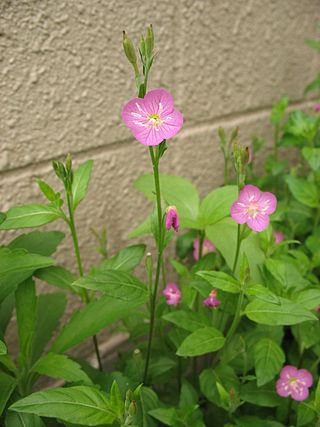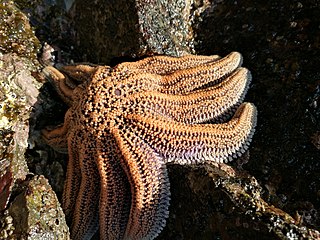
The Asteriidae are a diverse family of Asteroidea in the order Forcipulatida. It is one of three families in the order Forcipulatida.

Euglandina rosea, the rosy wolfsnail or cannibal snail, is a species of medium-sized to large predatory air-breathing land snail, a carnivorous terrestrial pulmonate gastropod mollusk in the family Spiraxidae.
Anstisia rosea, the karri or roseate frog is a species in the family, Myobatrachidae. It is endemic to Southwest Australia.

The rosy thrush-tanager or rose-breasted thrush-tanager is a species of bird in the currently monotypic genus Rhodinocichla. It was formerly assigned to the family Thraupidae and more recently viewed as being of uncertain placement; a 2015 molecular study places it closest to the Calcariidae. Found in Colombia, Costa Rica, Mexico, Panama, and Venezuela, its natural habitats are subtropical or tropical dry forests, subtropical or tropical moist lowland forests, and heavily degraded former forest.

Partula dentifera is an extinct species of air-breathing tropical land snail, a terrestrial pulmonate gastropod mollusk in the family Partulidae. This species was endemic to the Raiatea in the Society Islands of French Polynesia, where the last live individual was seen in 1972. It was officially declared extinct by the International Union for Conservation of Nature in June 2024.

Oenothera rosea, also known as rosy evening-primrose, rose evening primrose, pink evening primrose, or Rose of Mexico, is a species of flowering plant in the family Onagraceae. It is native to the Americas but can also be found as an introduced species in several regions of the world.

Incisura rosea, common name the rosy slit shell, is a species of small sea snail, a marine gastropod mollusc in the family Scissurellidae.

Antennaria rosea is a North American species of flowering plant in the family Asteraceae known by the common name rosy pussytoes. Other common names include cat's foot and mountain everlasting. The second part of its scientific name, rosea, is Latin for pink.

Mycena rosea, commonly known as the rosy bonnet, is a species of bioluminescent mushroom in the family Mycenaceae. First named Agaricus roseus in 1803 by Danish botanist Heinrich Christian Friedrich Schumacher, it was given its present name in 1912 by Gramberg.

Nephropsis rosea, sometimes called the rosy lobsterette or two-toned lobsterette, is a species of lobster.

Phenacovolva rosea, also known as the rosy spindle cowry, is a species of sea snail, a marine gastropod mollusc in the family Ovulidae, the ovulids, cowry allies or false cowries. It lives and feeds on fan, whip and bush-type gorgonians.

Russula rosea, known as the rosy russula, is a north temperate, commonly found mushroom of the large "brittlegill" genus Russula.

Zephyranthes rosea, commonly known as the Cuban zephyrlily, rosy rain lily, rose fairy lily, rose zephyr lily or the pink rain lily, is a species of rain lily native to Peru and Colombia. They are widely cultivated as ornamentals and have become naturalized in tropical regions worldwide. Like all rain lilies, they are known for blooming only after heavy rains.

Tricolia rosea, common name the rosy pheasant, is a species of small sea snail with calcareous opercula, a marine gastropod mollusk in the family Phasianellidae, the pheasant snails.

The Stichasteridae are a small family of Asteroidea in the order Forcipulatida. Genera were formerly unassigned, or in the family Asteriidae.

Sorbus rosea is a species of rowan native to Kashmir in Pakistan. It is a small tree with large pink flowers and berries, dark green leaves turning to red in the Autumn, and reddish bark with silver patches. It has gained the Royal Horticultural Society's Award of Garden Merit as an ornamental.
















